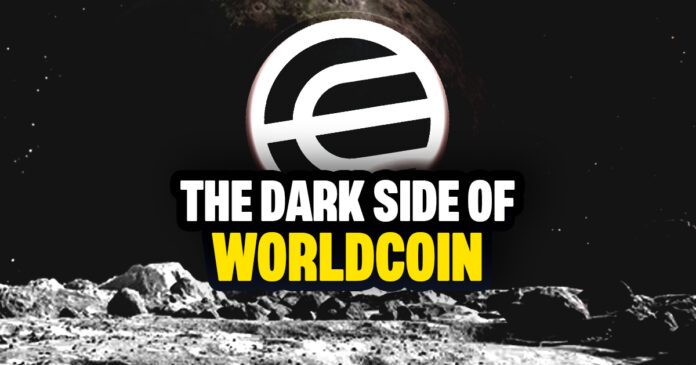One concerning aspect of WorldCoin’s approach is its reliance on centralized iris scanning for identity verification, which raises significant privacy and security concerns.
In this article, we delve into the negatives of WorldCoin and the risks involved in entrusting a centralized entity with our most personal information. Let’s explain each point:
1) The Pitfalls of Centralization
One of the founding principles of blockchain technology was decentralization, aiming to eliminate the need for trust in a single central authority. However, WorldCoin’s approach to identity verification contradicts this fundamental concept.
By relying on a centralized iris scanning system, individuals are required to surrender their most intimate biometric data to a single entity, thereby creating a honeypot of sensitive information vulnerable to exploitation.
I thought crypto was about anonymity, privacy and freedom from third party abuse…
…and not about scanning your iris and giving that data to a third party to prove you are human.
If this is the direction of crypto in the future, I may be in the wrong market. #WLD #Worldcoin pic.twitter.com/AKWySoxhgJ
— Duo Nine ⚡ Crypto Alpha (@DU09BTC) July 24, 2023
2) Privacy Invasion and Surveillance Concerns
Iris scanning technology, while touted for its accuracy and uniqueness, presents a grave concern regarding privacy invasion and mass surveillance. Centralized control over such a powerful identification system puts individuals at risk of constant monitoring and tracking of their activities, both online and offline.
The potential for misuse of this data by governments, corporations, or malicious actors raises alarming questions about the erosion of personal freedoms and civil liberties.
Worldcoin is taking full advantage of the fact that the vast majority of humans are complete fucking idiots who lack any ability to critically think about why they shouldn’t be exchanging their retina scan for a few dollars worth of absolute shitcoin. pic.twitter.com/TCs644tIqM
— Chris Blec (@ChrisBlec) July 24, 2023
Also, no system is impervious to data breaches, and centralized repositories of sensitive information pose a higher risk of cyberattacks. A successful breach of the iris scanning database could have catastrophic consequences, leading to identity theft, fraudulent transactions, and even blackmail.
Individuals may find themselves at the mercy of hackers who could exploit their biometric data for nefarious purposes.
3) Lack of Anonymity and Profiling
Anonymity has been one of the key appeals of cryptocurrencies, allowing users to transact without revealing their real-world identities. However, with WorldCoin’s centralized iris scanning system, anonymity is compromised.
Scan your eye to begin
ChatGPT’s parent company Open AI just announced that their digital currency is going live, called World Coin
you have to scan your eye to sign up for their digital ID, and they “might” pay you Universal Basic Income which comes from ai
Ethereum’s founder… pic.twitter.com/lABlug7RMz
— Crypto Tea (@CryptoTea_) July 24, 2023
Users are forced to link their iris data to their digital wallet, enabling authorities or corporations to trace transactions back to individuals. This could lead to profiling and discrimination based on financial history or spending patterns, further eroding user trust in the system.
4) Exclusion of Marginalized Communities
Requiring individuals to use iris scanning for identity verification can lead to the exclusion of marginalized communities that may not have access to the necessary technology or have physical conditions that hinder iris scanning. This exacerbates existing inequalities and contradicts the very notion of financial inclusivity that WorldCoin claims to promote.
Worldcoin distributed ~25 WLD to 90,000 participants, totaling 2.25M to the global community. So who on earth is selling blocks of size 400,000 WLD, ie 20% of the entire global community’s supply?
Anyone have more info on the token distribution today / where this supply is from? pic.twitter.com/YV2JdRHpr7
— DeFi^2 (@DefiSquared) July 24, 2023
Also, centralized systems pose a single point of failure, as they rely on a central authority to maintain and verify data. Any technical issues, power outages, or disruptions in the central system could cripple the entire network, leaving users unable to access their funds or engage in transactions. This lack of resilience stands in contrast to the decentralized nature of blockchain technology.
5) Government Surveillance and Control
Centralized iris scanning raises concerns about government surveillance and control over financial transactions. Governments may use this technology to monitor citizens’ financial activities closely, potentially infringing on privacy rights and stifling dissent. The fear of punitive measures for unpopular opinions or political views could deter individuals from using WorldCoin. Leading to a less diverse and vibrant ecosystem.
Conclusions
While WorldCoin’s ambition to create a universal currency for global prosperity is commendable. The negatives of its centralized iris scanning approach cannot be overlooked. Privacy invasion, security vulnerabilities, exclusion of marginalized communities, and potential government surveillance pose significant risks to user trust. And the broader ethos of decentralization in the cryptocurrency space.
As the world moves forward into a digital era, striking a balance between technological innovation and safeguarding individual rights and freedoms is crucial. Embracing advanced verification methods that prioritize user privacy and decentralization while maintaining security. It can pave the way for a more equitable and inclusive future for cryptocurrencies.
.@Binance, @HuobiGlobal and @Bybit_Official have listed @worldcoin‘s WLD token, which is already up over 10% on crypto exchanges. @egreechee reports.https://t.co/e2JLuzyqxw
— CoinDesk (@CoinDesk) July 24, 2023
As users and stakeholders, it is essential to critically evaluate the risks and implications of any new technology. Urging projects like WorldCoin to adopt privacy-centric and decentralized alternatives to protect users’ rights. And foster a truly global and prosperous future.
⬆️ For more cryptocurrency news, check out the Altcoin Buzz YouTube channel.
⬆️ Our popular Altcoin Buzz Access group generates tons of alpha for our subscribers. And for a limited time, it’s Free. Click the link and join the conversation today.




























